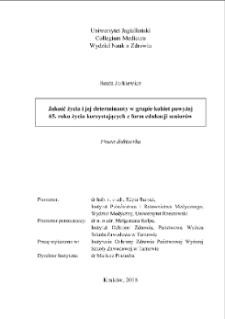Object
Title: Quality of life and its determinants in a group of women aged over 65, making use of forms of education for seniors
Abstract:
Introduction. In the face of an ageing society, knowledge concerning the factors which determine our quality of life gain increasing significance. Opening oneself up towards permanent education dictated, inter alia, by civilization’s progress, attests to the attitude of responsibility for one’s own life and has a positive influence on the quality of one’s elderly age. Due to the increasing feminization of the elderly and the different socialization of both women’s and men’s lives, it is impossible to understand the ageing process without conducting separate analyses for both genders.The purpose of the thesis is to assess the quality of life and its determinants in a group of women aged over 65 (with regard to age groups), making use of various forms of education for seniors.Material and methods. The study was conducted among the female residents of the Tarnowski District aged over 65: 205 educationally active seniors (group I) and 207 women remaining in the domestic environment, who do not make use of education targeted at elderly people (group II). A division was made according to the following age criteria: the young old (aged 65-75), the old (aged 76-85) and the oldest old (aged >85). The study used the diagnostic poll method and the standardized interview technique. The following tools for gathering data were applied: WHOQoL-AGE quality of life questionnaire (The World Heal ; th Organization Quality of Life Assessment in the Elderly), the Instrumental Activities of Daily Living (IADL), Geriatric Depression Scale (GDS), Short Camberwell Assessment of Need for the Elderly (CANE), Social Support List 12 — Interactions (SSL-12I), and the author’s original questionnaire for the interview. The study was carried out in the period from January 2016 to January 2017.Results. The women from group I obtained significantly higher results in the area of global quality of life compared to women from group II, whereas the lowest results in the WHOQoL-AGE scale referred to the seniors in the oldest old division. Quality of life (QoL) in the case of the women from group I depended largely on their material situation. The majority of chronic diseases accounted for the generally lower quality of life (this correlation was more strongly expressed in group II). In both groups, QoL was determined by the level of physical activity (positive correlations). The seniors from group I indicated a higher level of performance in carrying out more complex activities of daily living compared to the women from group II and the highest level of performance occurred in the case of women from the youngest age groups. In both groups, a higher level of performance on the IADL scale was linked to the respondents’ higher QoL. On the other hand, the higher GDS result resulted from lower QoL ; in both groups, with this correlation having the strongest expression in the case of women in the oldest old division. The seniors from group II assessed both general support and each of the subscales of SSL-12I significantly higher. The level of the respondents’ quality of life in both groups increased with higher scoring on the SSL-12I scale. The seniors from both groups displayed the largest number of physical needs. The women from group II declared all types of needs more (with the exception of non-satisfied environmental needs) compared to the seniors from group I. In group II, a larger number of needs in all categories correlated significantly with lower scoring on the WHOQoL-AGE scale., Conclusions. The educationally active seniors indicated a higher level of performance in carrying out more complex activities of daily living, as well as obtaining a higher level of QoL. Age, material status, physical activity, and level of performance all have an influence on the indices of the seniors’ quality of life. The best results overall were obtained by the women from group I.Postulates. The continuation of the study on the quality of seniors’ lives organized according to the participants’ gender. The practical application of the results of the study in the development of the strategy for promoting the health of women aged over 65 in the population of the city and Tarnów Distric ; t.
Place of publishing:
Level of degree:
Degree discipline:
Degree grantor:
Promoter:
Barnaś, Edyta ; Kołpa, Małgorzata
Date issued:
Identifier:
Call number:
Language:
Access rights:
Object collections:
Last modified:
Mar 13, 2023
In our library since:
May 6, 2019
Number of object content hits:
13
Number of object content views in PDF format
1
All available object's versions:
http://dl.cm-uj.krakow.pl:8080/publication/4276
Show description in RDF format:
Show description in OAI-PMH format:
| Edition name | Date |
|---|---|
| ZB-128618 | Mar 13, 2023 |
Objects
Similar
Jurkiewicz, Beata
Tyrka, Anna
Kloch-Badełek, Małgorzata
Chmiel, Izabela
Kochman, Małgorzata
Milaniak, Irena
Kin-Dąbrowska, Joanna
Stodolska, Agata

